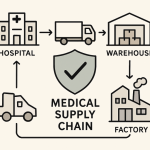When it comes to online security and privacy, proxies play a crucial role in safeguarding your digital footprint. Whether you’re a seasoned internet user or just getting started with online activities, understanding the different types of proxies and their functionalities is essential. In this blog post, we will delve into the world of static and rotating proxies, comparing their features, benefits, and best use cases. By the end of this comparison, you’ll have a clearer understanding of which proxy type aligns with your specific needs and preferences. So, let’s embark on this insightful journey into the realm of proxies to empower your online experiences.
II. Static Proxies
A. Definition and Functionality
Static proxies are IP addresses that remain fixed and do not change over time. They provide users with a stable and consistent connection to the internet, making them ideal for tasks that require a high level of reliability and security. These proxies are commonly used for activities such as web scraping, online anonymity, and accessing geo-restricted content.
B. Use Cases and Benefits
The use cases for static proxies are diverse and include activities like market research, ad verification, brand protection, and social media management. One of the key benefits of using static proxies is their reliability. Since the IP address remains constant, users can establish a predictable online presence without the risk of being blocked or flagged by websites.
C. Limitations and Drawbacks
Despite their advantages, static or rotating proxies have certain limitations. For instance, they may not be suitable for tasks that require frequent IP changes or access to multiple geolocations simultaneously. Additionally, they can be easier to detect by websites due to their consistent nature.
III. Rotating Proxies
A. Definition and Functionality
Rotating proxies, also known as backconnect proxies or rotating residential proxies, are IP addresses that automatically change at regular intervals or upon each request. This dynamic nature allows users to access the internet from different locations and reduce the likelihood of being blocked or identified by websites.
B. Use Cases and Benefits
Rotating proxies are well-suited for web scraping projects that involve large-scale data extraction from various sources. They also offer an effective solution for tasks requiring frequent IP rotations such as price monitoring, ad verification, and market intelligence gathering.
C. Limitations and Drawbacks
While rotating proxies offer versatility in terms of IP rotation and location diversity, they may exhibit occasional connection issues or slower response times compared to static proxies due to their dynamic nature.
IV. Comparison
A. Performance and Speed
One of the key factors to consider when choosing between static and rotating proxies is their performance and speed. Static proxies offer consistent performance since they provide a dedicated IP address that remains unchanged over time. This stability can be advantageous for tasks that require reliable connections and consistent data retrieval. On the other hand, rotating proxies utilize a pool of IP addresses that change at regular intervals or upon each request. While this dynamic nature can enhance anonymity and bypass certain restrictions, it may also result in varying speeds and potential connection issues.
B. IP Address Management
In terms of IP address management, static proxies provide a fixed IP address assigned to the user. This allows for easier tracking and management of online activities associated with that specific IP address. Rotating proxies, on the other hand, offer a constantly changing set of IP addresses from which requests are routed. This can make it more challenging for websites or online platforms to track user activity back to a single source.
C. Security and Anonymity
Security and anonymity are crucial considerations when evaluating proxy options. Static proxies offer a higher level of predictability and control over the assigned IP address, which can contribute to enhanced security for certain tasks such as web scraping or accessing geo-restricted content. Rotating proxies excel in providing a higher degree of anonymity due to their constantly changing IP addresses, making it more difficult for websites to detect patterns or track user behavior.
D. Pricing and Scalability
When it comes to pricing and scalability, static proxies often come with fixed costs associated with maintaining dedicated IPs. While this may be suitable for specific use cases requiring stable connections, it might not be as cost-effective for large-scale operations or tasks that benefit from utilizing diverse IP addresses. Rotating proxies typically offer more flexible pricing models based on usage or access to larger pools of IP addresses, making them potentially more scalable for varied requirements.
V. Use Cases
A. Industries and Applications for Static Proxies
Static proxies find relevance in industries such as market research, ad verification, brand protection, SEO monitoring, social media management tools among others where consistent data collection from specific sources is essential.
B. Industries and Applications for Rotating Proxies
Rotating proxies are well-suited for web scraping projects requiring high levels of anonymity by frequently changing IPs; sneaker copping bots needing multiple IPs; social media automation tools; ad verification services; SEO ranking tracking tools among others where frequent rotation is beneficial.
In conclusion
This detailed comparison sheds light on the distinct characteristics of static proxies versus rotating proxies across various parameters including performance & speed,
IP address management,
security & anonymity,
pricing & scalability,
as well as their use cases across different industries & applications.
Understanding these differences is crucial in selecting the right type of proxy that aligns with your specific requirements.
Whether you prioritize consistency or flexibility,
predictability or anonymity,
there’s a proxy solution tailored to meet your unique needs.
Lynn Martelli is an editor at Readability. She received her MFA in Creative Writing from Antioch University and has worked as an editor for over 10 years. Lynn has edited a wide variety of books, including fiction, non-fiction, memoirs, and more. In her free time, Lynn enjoys reading, writing, and spending time with her family and friends.















